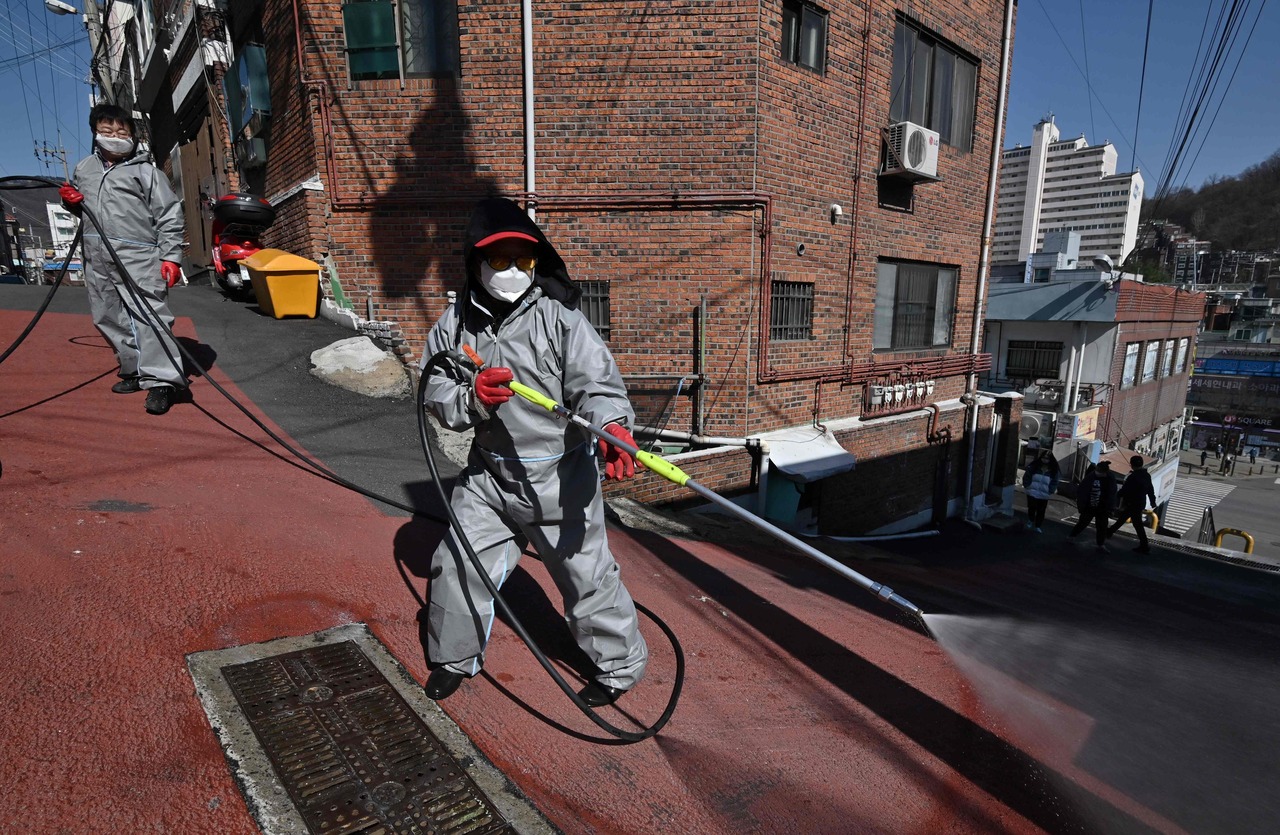Coronavirus: South Korea tightens border checks as domestic transmission abates
Sign up now: Get insights on Asia's fast-moving developments

A worker wearing protective gear sprays disinfectant near a building in Seongnam, South Korea, on March 16, 2020.
PHOTO: AFP
SEOUL (REUTERS) - South Korea said on Tuesday (March 17) it plans to tighten border checks for all arrivals from overseas to prevent new cases of the coronavirus coming into the country at a time when domestically transmitted infections are subsiding.
The stricter checks for all arrivals will start on Thursday and come as China also stepped up monitoring of foreign travellers, in the latest sign of the pandemic's shifting centre of gravity from Asia to Europe.
"We've assessed that there's a need for universal special entry procedures for all arrivals, given rapid increases in new cases not only in Europe but also in the United States and Asia in the wake of the pandemic," Vice Health Minister Kim Gang-lip told a briefing.
The Korea Centres for Disease Control and Prevention (KCDC) reported 84 new coronavirus cases as of Tuesday. It was the third day in a row that the county has reported fewer than 100 new infections, raising hopes that Asia's largest outbreak outside China may be easing.
The new numbers are well below a Feb 29 peak of 909, and bring the country's total infections to 8,320, the KCDC said. The death toll rose by two to 81.
There are 55 cases involving infected travellers, including eight foreign nationals, up from 44 recorded on Sunday. The other 47 are South Koreans, 27 of whom came from Europe, as well as 16 from China and another 12 from other Asian countries, KCDC deputy director Kwon Jun-wook said.
Seoul has already imposed strict border checks on visitors from China, Italy and Iran, requiring them to sign up by a smartphone application to track whether they have any symptoms such as fever.
Asked whether the government was considering closing borders, Kwon said the current efforts make a "very rational and reasonable policy for the time being." "It is much more important to stick to our fundamental efforts to find, quarantine and treat patients and examining links of infections," he told reporters.
SMALLER CLUSTERS
President Moon Jae-in has said he was increasingly confident South Korea would overcome the virus as the rate of new cases continued to drop.
Another 264 patients were released on Tuesday from hospitals where they had been isolated for treatment, bringing the total to 1,401, the KCDC said.
South Korea reported more recoveries than new infections on Friday for the first time since its outbreak emerged in January.
Testing and treatment of patients is nearing completion in the hardest-hit city of Daegu, home to a fringe Christian church that was at the centre of the outbreak in South Korea.
But authorities renewed warnings against clusters that continue to emerge, especially in the greater Seoul area.
The education ministry on Tuesday postponed the beginning of all schools' new semester by another two weeks to April 6, citing concerns about infections in smaller clusters.
At least 134 cases have been linked to a Seoul-based call centre whose 800-strong workforce is being tested or in quarantine.
In Seongnam, south of Seoul, 47 members of a Protestant church have tested positive, including the pastor, who attended services twice early this month despite government calls to cancel mass gatherings.
The vice health minister said people at the church had even rinsed their mouths using the same salt water sprayer in an ill-advised effort to disinfect themselves.
"That is an example of how misinformation could raise the risks of infection," he said. "Once again, we're requesting the citizens to refrain from attending gatherings in enclosed space as much as possible."


